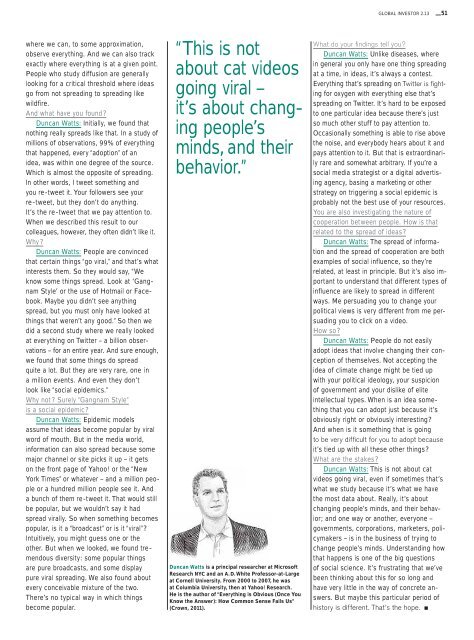New Mobility
Easing global gridlock Global Investor, 02/2013 Credit Suisse
Easing global gridlock
Global Investor, 02/2013
Credit Suisse
Create successful ePaper yourself
Turn your PDF publications into a flip-book with our unique Google optimized e-Paper software.
GLOBAL INVESTOR 2.13 — 51<br />
where we can, to some approximation,<br />
observe everything. And we can also track<br />
exactly where everything is at a given point.<br />
People who study diffusion are generally<br />
looking for a critical threshold where ideas<br />
go from not spreading to spreading like<br />
wildfire.<br />
And what have you found?<br />
Duncan Watts: Initially, we found that<br />
nothing really spreads like that. In a study of<br />
millions of observations, 99% of everything<br />
that happened, every “adoption” of an<br />
idea, was within one degree of the source.<br />
Which is almost the opposite of spreading.<br />
In other words, I tweet something and<br />
you re-tweet it. Your followers see your<br />
re-tweet, but they don’t do anything.<br />
It’s the re-tweet that we pay attention to.<br />
When we described this result to our<br />
colleagues, however, they often didn’t like it.<br />
Why?<br />
Duncan Watts: People are convinced<br />
that certain things “go viral,” and that’s what<br />
interests them. So they would say, “We<br />
know some things spread. Look at ‘Gangnam<br />
Style’ or the use of Hotmail or Facebook.<br />
Maybe you didn’t see anything<br />
spread, but you must only have looked at<br />
things that weren’t any good.” So then we<br />
did a second study where we really looked<br />
at everything on Twitter – a billion observations<br />
– for an entire year. And sure enough,<br />
we found that some things do spread<br />
quite a lot. But they are very rare, one in<br />
a million events. And even they don’t<br />
look like “social epidemics.”<br />
Why not? Surely “Gangnam Style”<br />
is a social epidemic?<br />
Duncan Watts: Epidemic models<br />
assume that ideas become popular by viral<br />
word of mouth. But in the media world,<br />
information can also spread because some<br />
major channel or site picks it up – it gets<br />
on the front page of Yahoo! or the “<strong>New</strong><br />
York Times” or whatever – and a million people<br />
or a hundred million people see it. And<br />
a bunch of them re-tweet it. That would still<br />
be popular, but we wouldn’t say it had<br />
spread virally. So when something becomes<br />
popular, is it a “broadcast” or is it “viral”?<br />
Intuitively, you might guess one or the<br />
other. But when we looked, we found tremendous<br />
diversity: some popular things<br />
are pure broadcasts, and some display<br />
pure viral spreading. We also found about<br />
every conceivable mixture of the two.<br />
There’s no typical way in which things<br />
become popular.<br />
“This is not<br />
about cat videos<br />
going viral –<br />
it’s about changing<br />
people’s<br />
minds, and their<br />
behavior.”<br />
Duncan Watts is a principal researcher at Microsoft<br />
Research NYC and an A. D. White Professor-at-Large<br />
at Cornell University. From 2000 to 2007, he was<br />
at Columbia University, then at Yahoo! Research.<br />
He is the author of “Everything is Obvious (Once You<br />
Know the Answer): How Common Sense Fails Us”<br />
(Crown, 2011).<br />
<br />
Duncan Watts: Unlike diseases, where<br />
in general you only have one thing spreading<br />
at a time, in ideas, it’s always a contest.<br />
Everything that’s spreading on ing<br />
for oxygen with everything else that’s<br />
spreading on Twitter. It’s hard to be exposed<br />
to one particular idea because there’s just<br />
so much other stuff to pay attention to.<br />
Occasionally something is able to rise above<br />
the noise, and everybody hears about it and<br />
pays attention to it. But that is extraordinarily<br />
rare and somewhat arbitrary. If you’re a<br />
social media strategist or a digital advertising<br />
agency, basing a marketing or other<br />
strategy on triggering a social epidemic is<br />
probably not the best use of your resources.<br />
You are also investigating the nature of<br />
cooperation between people. How is that<br />
related to the spread of ideas?<br />
Duncan Watts: The spread of information<br />
and the spread of cooperation are both<br />
examples of social influence, so they’re<br />
related, at least in principle. But it’s also important<br />
to understand that different types of<br />
influence are likely to spread in different<br />
ways. Me persuading you to change your<br />
political views is very different from me persuading<br />
you to click on a video.<br />
How so?<br />
Duncan Watts: People do not easily<br />
adopt ideas that involve changing their conception<br />
of themselves. Not accepting the<br />
idea of climate change might be tied up<br />
with your political ideology, your suspicion<br />
of government and your dislike of elite<br />
intellectual types. When is an idea something<br />
that you can adopt just because it’s<br />
obviously right or obviously interesting?<br />
And when is it something that is going<br />
<br />
it’s tied up with all these other things?<br />
What are the stakes?<br />
Duncan Watts: This is not about cat<br />
videos going viral, even if sometimes that’s<br />
what we study because it’s what we have<br />
the most data about. Really, it’s about<br />
changing people’s minds, and their behavior;<br />
and one way or another, everyone –<br />
governments, corporations, marketers, policymakers<br />
– is in the business of trying to<br />
change people’s minds. Understanding how<br />
that happens is one of the big questions<br />
of social science. It’s frustrating that we’ve<br />
been thinking about this for so long and<br />
have very little in the way of concrete answers.<br />
But maybe this particular period of

















